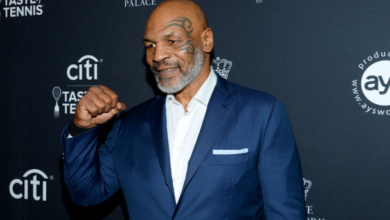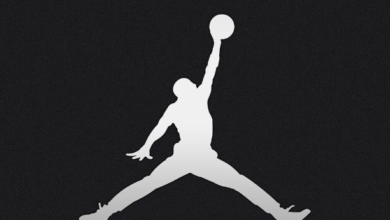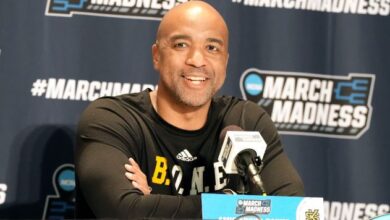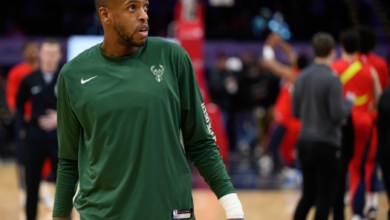Georgia native Waters finds a new home with the KC Royals after leaving his hometown team
Drew Waters blasted the first home run of spring training for the Atlanta Braves, a mammoth shot to left-center in the opening game of the Grapefruit League exhibition season.
At the time, it might have seemed like a harbinger of things to come for the Braves’ top prospect and former second-round draft pick.
Instead, Waters made his major-league debut last month in Kansas City wearing a Royals uniform and where he’s already viewed as a potential center fielder of the future.
Waters, a 23-year-old switch-hitting outfielder and a potential five-tool force, has played in 15 MLB games for an organization to which he’s still just getting acclimated. But he has embraced the new setting and the opportunity to be a big leaguer.
A Georgia native and former high school Player of the Year for his home state, it’s easy to assume the pressure of being the hometown kid and expectations necessitated a fresh start for Waters.
But Waters expressed nothing but appreciation for his time with the Braves in an interview with The Star.
This new stage in his career isn’t as much about getting away from Georgia or the Braves as it is about him taking the next step towards becoming the player he and the Royals envision.
“When I look back at everything, it worked out perfect,” Waters said of starting his career with the Braves. “I feel like as a young kid, the hardest part about professional baseball is being away from home and being away from your support system.
“For me to be able to start my professional career in Atlanta with all my family right there, being able to come to most of my home games — I spent time in Rome, I spent two seasons in Gwinnett — I spent a lot of my time in the Atlanta area.”
Waters simply viewed playing close to home as a blessing because it gave him a really large support system. If there were pressure or expectations, they came from his own hopes and desires. They didn’t come from local people knowing his name or knowing where he grew up.
“Every night, my parents, my siblings, my grandparents, aunt and uncles, they’re at every game,” Waters said. “Even the tough days where you’re 0 for 4 with four strikeouts, it’s a little bit easier knowing your family is right there with you.”
A high motor and a competitive nature
Waters comes from a clan of competitors and athletes. His father, Mitch, played on the offensive line (tackle) at Georgia Tech and was an ACC All-Academic selection in the mid 1980s.
Waters’ siblings both played Division 1 college athletics. Older brother, Zach, played baseball at the University of Georgia, and his older sister, Caroline, played soccer at the University of Georgia.
Waters, the youngster of the group, was always running around playing some sport or competing at something related to athletics. He didn’t even have to be on land.
“A lot of my free time — when it wasn’t at a ballfield, whether it was for me or my siblings — was spent out on the lake,” Waters said. “We have a lake house up in North Georgia. The free weekends we had, we would go up there and spend the weekend out on the lake, wakeboarding, wake surfing, things like that.”
Sitting in front of the television or playing video games just didn’t do it for Waters, and that’s simply always been the way he was wired.
“My mom used to joke when I was younger that I didn’t play with toys, I’d only play with balls,” Waters said. “So it doesn’t surprise me that I’m playing a sport that involves balls and playing at this level.”
Etowah High School baseball coach Greg Robinson recognized the mix of athleticism, competitiveness and non-stop motor at a young age.
Robinson coached Waters for four years of high school, including his senior season when Etowah won the Georgia 7A state championship and Waters garnered Gatorade Player of the Year honors in Georgia.
But the first time Robinson encountered the young Waters, Robinson was umpiring a youth baseball game.
“I just happened to be behind the plate when he was batting,” Robinson recalled. “That’s the first time I saw him. He was able to get his hands through on a pitch that I thought was surely going to break his wood bat. But he’s always had really good hands. That has boded well for him in his career. I think that’s one of the many attributes he has.”
Robinson saw first-hand how “extremely competitive” Waters was whether on the baseball field, during a pickup basketball game, playing ping pong, playing cornhole, it didn’t matter the setting.
“There’s a lot of people that are athletic, but he always had this innate drive to be the best,” Robinson said. “I saw that at an early age. And he was just a great practice player. A lot of times when you’re playing in the outfield, you can take some practices off.
“But he always worked on his reads, his angles, his throws. There was always something he wanted to be better at. As good as he was — you can kind of coast when you’re the best player, I guess you could — but he couldn’t.”
Robinson also coached Dexter Fowler as a high school player, before Fowler went on to a major-league career that has included an all-star selection, a World Series championship and more than 1,300 hits.
Robinson likened Waters to Fowler in that both were always best player on the field in high school, but they contained a “passion to excel” that showed up everywhere from the weight room to the practice field to in conditioning and training sessions.
The way Waters went about it with a relentlessness infused with an innocent enthusiasm, made him special to be around.
“There’s such a joy about him,” Robinson said. “He’s just infectious to be around.”
A lot of late buzz as a senior
Waters continued to be a multi-sport athlete right up until high school. At one time or another, he ran track, played football, baseball and basketball.
He likely would’ve continued if he hadn’t sprained his MCL returning a kick on the football field and his father directed him to focus on baseball.
“I really didn’t know if I was good at baseball or not until really my 15-year-old year,” Waters said. “Things started to kind of pick up. I started to have college coaches come out to some of my summer games. I was like, ‘They’re here to watch me?’
“Even then, I committed to the University of Georgia. I wasn’t really on the national scale at all. Then I went to Perfect Game national when I was 17 going into my senior year, and I went from a kid going to college to all of a sudden I had agents calling my phone at home. I didn’t even know what an agent was. … So things happened quick for me in terms of realizing I could potentially go pro out of high school.”
During that senior season at Etowah, Waters batted .510 with 15 home runs, four triples and 13 doubles. In 14 state playoff games, Waters batted .525 (21 for 40) with five home runs, 13 extra-base hits, 16 walks, 15 runs scored and 17 RBIs.
“All of a sudden, I started to grow into my body, started to really figure out what made me tick and the next thing you know there’s pro scouts at my high school games and all my buddies were like, ‘This is the craziest thing I’ve ever seen,” Waters said. “’ I was like, ‘I’m right there with you. I can’t believe it either.’”
By the time the 2017 MLB Draft rolled around, Baseball America ranked him the No. 23 prospect in that year’s draft class.
Robinson points to that drive he saw in Waters early on as the reason for his meteoric rise.
“This is a kid that hit one home run his junior year, then hit 15 his senior year,” Robinson said. “The athleticism was there, but that passion to be the best he could be (drove his improvement).”
Upside the Royals couldn’t resist
After the hamstring injury in spring training derailed the start of Waters’ year with the Braves, it opened the door for Michael Harris II to take advantage of the chance to make an impression on Atlanta’s front office and eventually made the jump from Double-A to the majors. Harris has now solidified himself as the everyday center fielder.
When the Braves approached the Royals about trading for the Royals’ competitive balance pick in the MLB Draft (No. 35 overall), the Royals saw a lot of potential in Waters.
At the time, MLB.com rated Waters the top prospect in the Braves farm system. He’d struggled at the plate coming off of the pandemic shutdown, but he’d been a breakout star of the organization in 2019.
That year, he won Southern League MVP (the youngest since Delmon Young in 2005), won the Southern League batting title with a .319 average (a Mississippi single-season franchise record), led the Southern League in hits(134), doubles (35), triples (9) and extra-base hits (49). He finished second in the league in slugging percentage (.481) and OPS (.847).
Upon completion of the trade, Royals general manager J.J. Picollo even evoked the name of Lorenzo Cain, the dynamic center fielder who served as a centerpiece of their back-to-back World Series appearances in 2014 and 2015 and the championship in 2015.
“He’s a talented athlete who is still refining some skills,” Picollo said. “It’s not too dissimilar — not to put comparisons on him — but similar conversations to when we acquired Lorenzo Cain years ago. You know he’s got a chance to be a strong average to good player.
“He’s done things right that has established himself as a prospect. But then making those adjustments in the minor leagues before he gets to the big leagues is really going to determine what kind of player he is in the big leagues.”
So far, Waters seems to have embraced the approach the Royals hitting development staff has taken with him from game-planning to pregame preparation.
Waters has appreciated the change of scenery in that it has exposed him to a new perspective on the game as well as some different voices and approaches to coaching and teaching.
But the young man shaped by his Georgia upbringing has no resentment about having to leave home for the chance that now sits in front of him in Kansas City.
“Obviously, there’s pressure knowing that you want to be that guy for the city you’re from, but I think everyone’s end goal is to play in the big leagues and help whatever team they’re on win a world championship,” Waters said. “So I’m grateful to be here with the Royals and hopefully help them win a world championship one day.”
Source link





